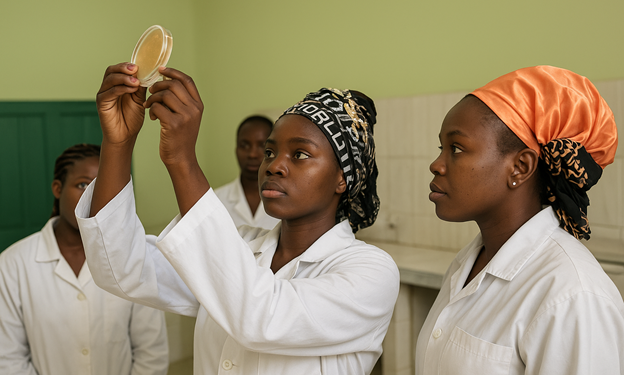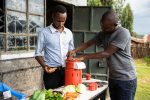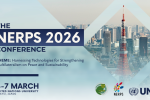The National University of Agriculture in Benin Announces First Cohort of TAGDev 2.0 Program Scholars for the 2025/26 Academic Year

National University of Agriculture (UNA), is proud to announce the selection of its first cohort of scholars under the TAGDev 2.0 program, a transformative initiative in partnership with the Regional University Forum for Capacity Building in Agriculture (RUFORUM) and Mastercard Foundation.
The National University of Agriculture (UNA) in Benin is committed to advancing academic and social inclusion by ensuring equitable access to quality education for all students, regardless of their social or geographical background. In this context, TAGDev 2.0, implemented through RUFORUM in partnership with Mastercard Foundation, is playing a pivotal role. Through this collaborative initiative, full scholarships are offered to talented African students, residing in Benin, from economically disadvantaged backgrounds and post-conflict areas, providing them not only with financial support, but also with enhanced academic support and practical training. TAGDev 2.0 scholarship recipients will develop entrepreneurial and leadership skills to enable them access to dignifying and fulfilling jobs and become agents of change in Benin’s agricultural sector and beyond.
Selection process
The call for applications at UNA attracted a total of 589 applications. Following a rigorous selection process beginning with a workshop for students’ admission on 25 April 2025 at Sakété Campus, where 136 BSc and 129 MSc applicants were shortlisted. From this pool, 87 candidates including 39 women and 2 differently abled persons advanced to home validations and psychometric assessments. After the final review, 25 outstanding students were awarded full scholarships, positioning them to become future leaders and change agents in their communities.
Below is a table listing the selected scholars for the bachelor’s program
| Nº | Recipient | Gender | Course |
| 1. | FADIKPE Ayékofè Martine | female | BSc. in Aquaculture |
| 2. | OKPEÏCHA Adénikè Naïmath | female | BSc. in Aquaculture |
| 3. | DASSI Senou Esperan | male | BSc. in Aquaculture |
| 4. | HOUNYE Emmanuelle Mahugnon | female | BSc. Agribusiness and Agricultural Policies |
| 5. | TOTA N’da Pierre | male | BSc. Agribusiness and Agricultural Policies |
| 6. | CHAFFA Lucresse | female | BSc. Agribusiness and Agricultural Policies |
| 7. | KINHA Josette Marie | female | BSc. Agribusiness and Agricultural Policies |
| 8. | TOTIN Houehanou Joseph Wolfram | male | BSc. In Conservation and Processing of Agro-products |
| 9. | KINHOUEYITO SOKOTALE Olive | female | BSc. In Conservation and Processing of Agro-products |
| 10. | HOUNKPEVI Christelle Meyisewhe | female | BSc. In Conservation and Processing of Agro-products |
| 11. | KINNANON Hélène | female | BSc. In Conservation and Processing of Agro-products |
| 12. | TEFFA Ourope Nadine Joïce | female | BSc. In Conservation and Processing of Agro-products |
| 13. | GBOYOU Marina Mystique Mahoutodji | female | BSc. Management and Operations of Livestock |
| 14. | AMOUYI Obassandjo Sourou Osthéo Joël | male | BSc. Management and Operations of Livestock |
| 15. | SERO Denise | female | BSc. Management and Operations of Livestock |
Below is a table listing the selected scholars for the Master program
| Nº | Recipient | Gender | Course |
| 1. | OYENIRAN Djessilatou Awèni | female | MSc. Food Science and Technology and Human Nutrition |
| 2. | ADONON Valentine Sènami Gilles | female | MSc. Food Science and Technology and Human Nutrition |
| 3. | AKPASSONOU Deomerck Ornella | female | MSc. Food Science and Technology and Human Nutrition |
| 4. | TCHEGBE Alphonse | male | MSc. Aquaculture |
| 5. | DJOI Sonagnon Lydie | female | MSc. Aquaculture |
| 6. | HOUNTON Nonhouégnon Gloria Chancelle | female | MSc. Plant Biotechnology and Seed Production |
| 7. | OGOUTCHEMI Adéléké | male | MSc. Plant Biotechnology and Seed Production |
| 8. | GOUNOU SAKA Zouliatou | female | MSc. Plant Biotechnology and Seed Production |
| 9. | ASSOUKOU Emmanuel | male | MSc. Tropical Forestry |
| 10. | DOUDJO Mahulomè Mèdéssè Anne Marie | female | MSc. Tropical Forestry |
About RUFORUM and TAGDev
RUFORUM, established in 2004, is a network of 175 universities across 40 African countries which collaborates globally with other university networks, development partners, policymakers, and leaders to leverage synergies and work towards shared objectives in delivering science solutions for development, human capital development, and institutional reform in the African Higher Agricultural Education (HAE) system. RUFORUM recognizes youth as the driving force of the change for a better Africa. Launched in partnership with the Mastercard Foundation, the TAGDev 2.0 (Transforming African Agricultural Universities to meaningfully contribute to Africa’s Growth and Development), a scale-up to TAGDev 1.0, is a 10-year (2023–2033) program being implemented in 12 African universities, namely;
- Africa University (Zimbabwe)
- Egerton University (Kenya)
- Gulu University (Uganda)
- Malawi University of Science and Technology (Malawi)
- Mohammed VI Polytechnic University (Morocco)
- National University of Agriculture (Benin)
- Uganda Martyrs University (Uganda)
- University of Bamenda (Cameroon)
- University of Eldoret (Kenya)
- University of Cape Coast (Ghana)
- University of Port Harcourt (Nigeria)
- University of Free State (South Africa)
TAGDev 2.0 is designed to;
- Expand equal work opportunities for young women and men in the agricultural sector;
- Improve climate adaptive agricultural production and productivity with a focus on value chains;
- Strengthening the quality of higher agricultural education outcomes in training, research and innovation.
Why it matters
TAGDev 2.0 is more than just a scholarship, it is a unique transformative pathway through which UNA is nurturing a new generation of agricultural leaders and entrepreneurs. Beyond providing financial support, the initiative serves as a catalyst for systemic change, tackling interlinked challenges of education, youth unemployment, and agricultural development in Benin. In a country where livelihoods largely depend on agriculture, investing in skilled, innovative, and socially committed professionals is critical. TAGDev 2.0 empowers young people from disadvantaged backgrounds to access quality education, thereby reducing social inequalities and strengthening national human capital. By embedding practical training, entrepreneurship, and leadership development rooted on climate adaptive, productive and competitive agricultural value chains, the program equips graduates not only to secure decent employment but also to generate opportunities for others. As such TAGDev 2.0 contributes directly to the sustainable transformation of Benin’s agricultural sector, youth employment, and wealth creation.
To learn more about the TAGDev 2.0 program at UNA, follow the social media handles below;





